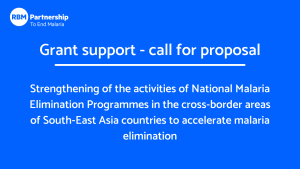Reference: CFP-UNOPS-RBM-2022-001
Beneficiary countries: Multiple destinations
Published on 18-Mar-2022
Deadline on: 25-Apr-2022 23:59 (GMT 1.00) Western Europe Time, London, Lisbon, Casablanca
Description:
The RBM Partnership to End Malaria is the global platform for coordinated action against malaria. It mobilizes for action and resources and forges consensus among partners. The Partnership is comprised of more than 500 partners, including malaria endemic countries, their bilateral and multilateral development partners, the private sector, nongovernmental and community-based organizations, foundations, and research and academic institutions. For more info check the RBM website: www.endmalaria.org.
The RBM structure consists of its Secretariat and Partner Committees focused on the three priorities of the Partnership: Advocacy & Resource Mobilization (ARMPC), Strategic Communications (SCPC) and Country/Regional Support (CRSPC). Most notably, the purpose of the CRSPC is to provide a platform to engage the RBM Partnership community in coordinating support to countries and regions as they execute their malaria control and elimination implementation programs.
According to WHO world malaria report 2021, the South-East Asia Region accounts for about 2% of the burden of malaria cases globally. Malaria cases reduced by 78%, from 23 million in 2000 to about 5 million in 2020. Malaria case incidence in this region reduced by 83%, from about 18 cases per 1000 population at risk in 2000 to about 3 cases in 2020. Malaria deaths are also reduced by 75%, from about 35000 in 2000 to 9000 in 2020.
A large portion of the malaria burden is driven by difficult-to-reach communities and migrant populations living in border areas. Cross-border malaria is a recurrent issue due to unregulated migration, weak health delivery systems, and lack of coordination along the border districts in malaria elimination countries. Support to sustainable coordinated regional cross-border initiatives is needed to speed up reductions of malaria cases and deaths and accelerate malaria elimination in the countries and sub-regions. Focusing on cross border malaria elimination is a prerequisite and priority not only to achieve the 2030 WHO GTS target but also for sustaining it beyond 2030 in the South-East Asia region.
This grant is the continuation of the previous support provided to the region through RBM. The current grant period will be from 01 July 2022 to 30 November 2023 and its purpose is to continue to provide support started for the cross-border coordination of the effort of malaria elimination in South-East Asia countries and mitigate the impact of COVID-19.
Objectives of the Grant:
The successful applicant will be involved in supporting the coordination efforts by countries in South-East Asia and work closely with the RBM Partnership, specifically CRSPC.
The successful grantee will address the following objectives:
- Continue to provide support to the countries in South-East Asia to coordinate malaria elimination activities in the cross-border areas and at sub-national level.
- Convene and coordinate partners to broker and mobilize support for South-East Asia countries in malaria elimination.
- Support sub-regional resource mobilization efforts to sustain malaria elimination in South-East Asia.
- Document the impact of the COVID-19 Pandemic on Malaria Elimination Programmes.
Key deliverables include:
- Cross-border malaria elimination coordination mechanisms reinforced.
- Coordination, regular M&E and cross-border areas conducted.
- Advocacy activities by Parliamentarians and regular meetings with partners conducted.
- Countries supported for their effort to mobilize domestic and external resources mobilization
- Meetings conducted at regional and country levels to review the technical implementation, advocacy and domestic and external resources mobilization efforts.
